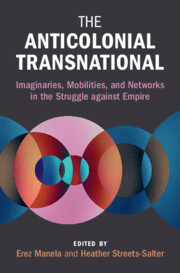Book contents
- The Anticolonial Transnational
- Global and International History
- The Anticolonial Transnational
- Copyright page
- Contents
- Figures
- Contributors
- Acknowledgments
- 1 Introduction
- Part I The Many Anticolonial Transnationals
- Part II Solidarities and Their Discontents
- 6 From Wife to Comrade: Agnes Smedley and the Intimacies of Anticolonial Solidarity
- 7 Cheikh Anta Diop’s Recovery of Egypt: African History as Anticolonial Practice
- 8 The Right to Petition in the Anticolonial Struggle at the United Nations
- 9 African Nationalism, Anti-Imperial Lexicons, and the Development of China–Tanzania Relations, 1960–1966
- Part III Anticolonialism in a Postcolonial Age
- Index
8 - The Right to Petition in the Anticolonial Struggle at the United Nations
from Part II - Solidarities and Their Discontents
Published online by Cambridge University Press: 10 August 2023
- The Anticolonial Transnational
- Global and International History
- The Anticolonial Transnational
- Copyright page
- Contents
- Figures
- Contributors
- Acknowledgments
- 1 Introduction
- Part I The Many Anticolonial Transnationals
- Part II Solidarities and Their Discontents
- 6 From Wife to Comrade: Agnes Smedley and the Intimacies of Anticolonial Solidarity
- 7 Cheikh Anta Diop’s Recovery of Egypt: African History as Anticolonial Practice
- 8 The Right to Petition in the Anticolonial Struggle at the United Nations
- 9 African Nationalism, Anti-Imperial Lexicons, and the Development of China–Tanzania Relations, 1960–1966
- Part III Anticolonialism in a Postcolonial Age
- Index
Summary
This chapter reflects upon the role of petitions in the history of transnational anticolonialism at the United Nations. Even though the UN circumscribed the right to petition in 1948 by excluding it from the Universal Declaration of Human Rights, anticolonial nationalists used petitions to oppose the return of colonial rule, condemn human rights abuses, and demand self-determination. The independence movement in Somaliland and the other former Italian colonies in Africa sent petitions to the Trusteeship Council, which in turn were supported by anticolonial UN delegations from the global South. Although Italy returned as the administering authority when the Trust Territory of Somaliland was formed, this collective effort led to the defeat of the Bevin–Sforza Plan and contributed to increasing international support for decolonization.
Keywords
- Type
- Chapter
- Information
- The Anticolonial TransnationalImaginaries, Mobilities, and Networks in the Struggle against Empire, pp. 162 - 176Publisher: Cambridge University PressPrint publication year: 2023

